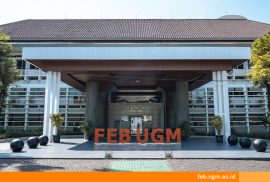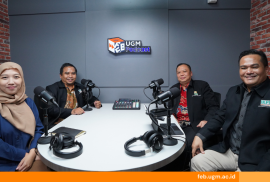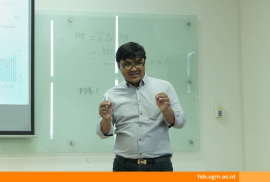The Faculty of Economics and Business (FEB) UGM, in collaboration with the Australia National University (ANU) Indonesia Project, held the Mubyarto Public Policy Forum on Tuesday (06/08/2024). The forum was held in a hybrid format via Zoom Meeting and offline at the FEB UGM Learning Center Auditorium.
The Mubyarto Public Policy Forum is a forum held in honor of Prof. Mubyarto, a prominent economist at Gadjah Mada University and one of Indonesia’s most influential intellectuals on rural development issues from the 1960s to the 1990s. The theme of the Mubyarto Public Policy Forum 2024 was “How to Build a Diverse Nation: Lessons from the Indonesian Experience” and invited Prof. Samuel Bazzi from the University of California San Diego as keynote speaker.
Samuel Bazzi spoke about good development practices in Indonesia. Indonesia, a nation rich in social and cultural diversity, has used this diversity as a capital for development. His presentation touched on several development programs developed in Indonesia’s post-independence period, such as transmigration, decentralization, land tenure reform, and mass construction of primary schools under the Presidential Instruction (INPRES). These programs were implemented to promote equality and inclusiveness by encouraging the use of Indonesian as an everyday language. The use of Indonesian as an everyday language fostered a more assertive nationalism by removing language barriers.
Bazzi also discussed the dualism or dichotomy of education in Indonesia as a tool for national development. The dichotomy of education here separates the education system into religious and general education. According to him, this system is unique because people with higher levels of education also have high levels of religiosity. “In many countries, historically, the development of mass schooling has completely disrupted and replaced the role of religious education. However, he explained that this has not happened in Indonesia and some other countries because of this dichotomous education system,” he said.
On this occasion, Bazzi also highlighted decentralization policies in development. These decentralization policies have the potential to spark intergroup conflict due to competition for political control and resources in new administrative regions. “Many social groups compete for resources, and this is one of the cases where the creation of new local governments actually increases competition for public resources,” he added.
According to him, as a multicultural country, Indonesia needs to be able to build a national identity amidst the existing diversity. This step must be taken to create a sense of belonging to a common identity as a nation.
Reportage: Najwah Ariella Puteri
Editor: Kurnia Ekaptiningrum
Sustainable Development Goals












